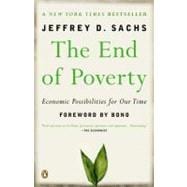
Note: Supplemental materials are not guaranteed with Rental or Used book purchases.
Purchase Benefits
Looking to rent a book? Rent End of Poverty : Economic Possibilities for Our Time [ISBN: 9780143036586] for the semester, quarter, and short term or search our site for other textbooks by Sachs, Jeffrey D. (Author); Bono (Foreword by). Renting a textbook can save you up to 90% from the cost of buying.
| Acknowledgments | p. vii |
| Foreword | p. xii |
| Preface to the Paperback Edition | p. xvi |
| Introduction | p. 1 |
| A Global Family Portrait | p. 5 |
| The Spread of Economic Prosperity | p. 26 |
| Why Some Countries Fail to Thrive | p. 51 |
| Clinical Economics | p. 74 |
| Bolivia's High-Altitude Hyperinflation | p. 90 |
| Poland's Return to Europe | p. 109 |
| Reaping the Whirlwind: Russia's Struggle for Normalcy | p. 131 |
| China: Catching up after Half a Millennium | p. 148 |
| India's Market Reforms: The Triumph of Hope Over Fear | p. 170 |
| The Voiceless Dying: Africa and Disease | p. 188 |
| The Millennium, 9/11, and the United Nations | p. 210 |
| On-the-Ground Solutions for Ending Poverty | p. 226 |
| Making the Investments Needed to End Poverty | p. 244 |
| A Global Compact to End Poverty | p. 266 |
| Can the Rich Afford to Help the Poor? | p. 288 |
| Myths and Magic Bullets | p. 309 |
| Why we Should do it | p. 329 |
| Our Generation's Challenge | p. 347 |
| Works Cited | p. 369 |
| Further Reading | p. 372 |
| Notes | p. 376 |
| Index | p. 385 |
| Table of Contents provided by Ingram. All Rights Reserved. |
The New copy of this book will include any supplemental materials advertised. Please check the title of the book to determine if it should include any access cards, study guides, lab manuals, CDs, etc.
The Used, Rental and eBook copies of this book are not guaranteed to include any supplemental materials. Typically, only the book itself is included. This is true even if the title states it includes any access cards, study guides, lab manuals, CDs, etc.
The path from poverty to development has come incredibly fast in the span of human history. Two hundred years ago, the idea that we could potentially achieve the end of poverty would have been unimaginable. Just about everybody was poor with the exception of a very small minority of royals and landed gentry. Life was as difficult in much of Europe as it was in India or China. With very few exceptions, your great-great-grandparents were poor and most likely living on the farm. One leading economic historian, Angus Maddison, puts the average income per person in Western Europe in 1820 at around 90 percent of the average income of sub-Saharan Africa today. Life expectancy in Western Europe and Japan as of 1800 was probably about forty years.
There was little sense a few centuries ago of vast divides in wealth and poverty around the world. China, India, Europe, and Japan all had similar income levels at the time of European discoveries of the sea routes to Asia, Africa, and the Americas. Marco Polo, of course, marveled at the sumptuous wonders of China, not at its poverty. Cortés and his conquistadores expressed astonishment at the riches of Tenochtitlán, the capital of the Aztecs. The early Portuguese explorers in Africa were impressed with the well-ordered towns in West Africa.
Until the mid-1700s, the world was remarkably poor by any of today’s standards. Life expectancy was extremely low; children died in vast numbers in the now rich countries as well as the poor countries. Disease and epidemics, not just the black death of Europe, but many waves of disease, from smallpox and measles to other epidemics, regularly washed through society and killed mass numbers of people. Episodes of hunger and extreme weather and climate fluctuations sent societies crashing. The rise and fall of the Roman Empire, for Arnold Toynbee, was much like the rise and decline of all other civilizations before and since. Economic history had long been one of ups and downs, growth followed by decline, rather than sustained economic progress.
The Novelty of Modern Economic Growth
If we are to understand why vast gaps between rich and poor exist today, we need therefore to understand a very recent period of human history during which these vast gaps opened. The past two centuries, since around 1800, constitute a unique era in economic history, a period that the great economic historian Simon Kuznets famously termed the period of Modern Economic Growth, or MEG for short. Before the era of MEG, indeed for thousands of years, there had been virtually no sustained economic growth in the world and only gradual increases in the human population…;